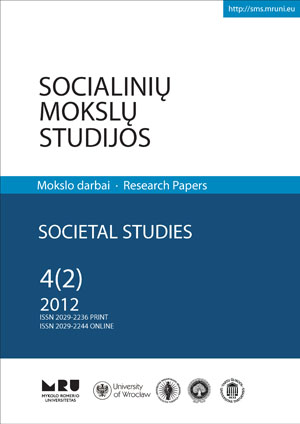Pirmosios kardinaliosios dorybės įvardijimo problema
The Problem of Naming the First Cardinal Virtue
Author(s): Gintautas VyšniauskasSubject(s): Social Sciences
Published by: Mykolas Romeris University
Keywords: virtue-ethics; cardinal virtues; wisdom; prudence; Aquinas; Aristotle
Summary/Abstract: From Plato Christianity borrowed the four classical virtues prudence or practical wisdom, justice, courage, and self-control; from Aristotle the distinction between intellectual and moral virtues. These borrowings cause considerable problems when transferred into the dense semantic field of the Lithuanian language for, unlike Latin (through which Lithuanians started their acquaintance with Christian philosophy in the 14th century), the Lithuanian language has no need of such distinction, which springs from the equivocate of virtue, for in its own lexicon it possesses distinct univocal names: for ethical virtue dorybė, and for intellectual virtue galia Thus, in the semantic field of the Lithuanian language, the Aristotelian distinction seems quite superfluous; for dorybė itself indicates morality without any additional qualification. Therefore the expression moral virtue seems an awkward pleonasm when formulated in purely Lithuanian words dorovinė dorybė. The substitution dorovinė by moralinė (moral) just conceals the problem, but does not solve it. Related to this there is another and even more serious problem: not only speculative but also practical, first of all didactically. The problem is how to name prudence, the first cardinal virtue, in Lithuanian. Some scholars, for example, D. M. Stančienė maintains that, when speaking of prudence, the noblest of cardinal virtues, one has to keep in mind the whole set of words: circumspection, rationality, wisdom, sagacity and so on, for no one of them, taken separately, expresses the meaning of prudentia. If this is true, then we find ourselves not in the semantic field but in the semantic swamp and the question concerning the possibility of Christian ethics in the Lithuanian language arises of itself. It seems as if the Lithuanian language resists being put into the Procrustean bed of foreign theories. The obvious sign of this resistance is the diversity of names given to that virtue. The translator of The Catechism of the Catholic Church presents prudentia as išmintingumas, which means either wisdom or judiciousness; the translator of Christian Ethics by Karl H. Paschke presents protingumas, which in English can be related to thirteen synonyms: rationality, sense, reasonableness, etc. There are other translation versions as well. Although at the beginning of Nicomachean Ethics Aristotle writes that only a fool could demand mathematical precision in ethics, nevertheless the Christian ethics is unlikely possible within the framework of the language which appears unable of providing the term for the first cardinal virtue. Relaying on the analysis of Aquinas’ Summa theologiae, Aristotle’s Nicomachean ethics translation from Greek and the Old Testament translation from Hebrew, Aramaic, and Greek the author of the article comes to the conclusion, that the most proper name for prudentia could be supratingumas, which is an approximate equivalent of English intelligence.
Journal: Socialinių mokslų studijos
- Issue Year: 4/2012
- Issue No: 2
- Page Range: 517-525
- Page Count: 9
- Language: Lithuanian

